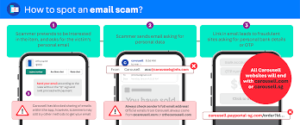In the bustling city-state of Singapore, a significant shift is on the horizon for advertisers using Facebook. By the close of June, all individuals and businesses looking to promote their products or services on the platform will need to undergo a verification process, which requires them to submit a government-issued identification document. This new mandate comes in response to a troubling 12 per cent rise in reports of fraudulent advertisements that plagued Facebook between June and December 2024.

During those six months, the Ministry of Home Affairs (MHA) had previously permitted Facebook to enforce this verification requirement selectively, targeting only those advertisers deemed “risky.” However, as the prevalence of scams continued to surge, the MHA indicated that it would not hesitate to impose stricter measures if necessary.
With the introduction of a new Code of Practice for E-Commerce Services in June 2024, platforms like Facebook and Carousell are now obliged to implement protective measures aimed at safeguarding users in Singapore from scam-related activities. Initially, between June and December 2024, these platforms were tasked with verifying only the identities of sellers categorised as “high-risk.”
Yet, on March 10, MHA expressed concerns regarding Facebook’s inability to effectively manage the increasing volume of scam advertisements during the latter half of 2024. The ministry pointed out that Meta, Facebook’s parent company, had limited its verification efforts exclusively to paid advertisements. This posed a significant issue, as police data indicated that scam advertisements included both paid promotions and unpaid posts.
In light of these developments, the MHA announced: “Meta plans to extend its verification process to encompass all advertisers on Facebook by the end of June 2025. We view this initiative positively and will keep a close watch on the situation as it unfolds.” This commitment marks a critical step toward enhancing user safety and restoring trust in online advertising within Singapore’s digital landscape.
Under the Online Criminal Harms Act (Ocha), failing to adhere to the established Code constitutes a criminal offence. Those found guilty could face substantial penalties, with fines reaching as high as $1 million. This legislation came into effect in February 2024 and aims to bolster online safety.
In an effort to enhance security within the digital marketplace, a pilot program was launched that included collaboration between Carousell and Facebook’s Marketplace and Pages services. This initiative provided both platforms with an opportunity to implement and test verification protocols for a select group of sellers and advertisers, allowing them to assess the effectiveness of these measures.
However, it is noteworthy that both Carousell and Facebook were ranked at the bottom of a yearly e-commerce safety assessment conducted by the Ministry of Home Affairs (MHA), which was released in April 2024. This ranking highlighted the pressing need for improvements in their online safety practices.

On March 10, MHA announced its satisfaction with the anti-scam initiatives implemented to screen certain users on Meta’s platforms and Carousell’s marketplace. As a result, they opted not to enforce mandatory verification for all sellers at this time. This decision reflected confidence in the current measures while still recognising the potential for future adjustments.
The efforts appeared to yield positive outcomes; reports indicated a remarkable decline of approximately 55 per cent in e-commerce scams on Facebook Marketplace between June and December 2024. MHA characterised this drop as a “significant improvement,” suggesting that the pilot program was beginning to bear fruit.
Nevertheless, MHA emphasised its commitment to ongoing vigilance regarding the landscape of e-commerce scams within the Marketplace. They stated, “We will continue to monitor the situation closely, and if conditions deteriorate, we may require Meta to implement identity verification for additional sellers.” This statement underscores the agency’s proactive approach to ensuring safety in online transactions, ready to adapt strategies as necessary to protect consumers in an ever-evolving digital marketplace.
In the realm of digital commerce, where the convenience of online transactions often intertwines with the lurking threat of scams, Meta’s director of public policy for Southeast Asia, Rafael Frankel, has shed light on potential future initiatives. He indicated that the user verification strategies currently being tested in Singapore might soon expand to other regions, contingent upon their success in this initial trial. However, he remained tight-lipped about the methods Facebook employs to flag suspicious accounts, wary that revealing such details could provide scammers with a roadmap to bypass detection.

Meanwhile, Carousell, a prominent online marketplace, found itself in a favourable position. The platform was spared from the obligation to verify every seller in its network due to a reported decline in e-commerce scams—an 11 per cent drop that, while modest, signals a positive trend. The Ministry of Home Affairs (MHA) acknowledged Carousell’s proactive stance and collaborative efforts in combatting fraudulent activities.
In an effort to enhance security, Carousell mandates that sellers engaged in high-risk categories—such as real estate—authenticate their identities through Singpass. Additionally, the platform is exploring ways to vet users deemed high-risk. This includes scrutinising new sellers with minimal profile ratings who engage in numerous chats or list items at prices that seem too attractive to be genuine.
The MHA has set a timeline for Carousell: they have six months to reduce the number of reported e-commerce scams. Should they fail to achieve this goal, the platform will be compelled to verify the identities of all sellers by October.

A recent analysis conducted by the MHA revealed troubling statistics regarding the landscape of online scams. Facebook emerged as a notable contributor, accounting for 37.4 per cent—or 4,368 cases—of reported e-commerce fraud in 2024. This data underscores the ongoing battle against online deception and highlights the importance of vigilance as digital marketplaces continue to evolve.
In the unfolding narrative of online transactions, Carousell emerged as a notable character, landing in the second position with 1,987 incidents of reported scams. This troubling figure represented a significant 17per cent of the overall e-commerce fraud cases.
As 2024 unfolded, the landscape of scams was predominantly marked by e-commerce schemes, which took centre stage with a staggering total of 11,665 reported incidents. The financial toll on victims was severe, with losses amounting to no less than $17.5 million. This alarming rise in fraudulent activity was evident when compared to the previous year; in 2023, the number of e-commerce scams was recorded at 9,783, with victims suffering losses totalling $13.9 million. The growth in these cases illustrated a worrying trend in the digital marketplace, highlighting the need for vigilance and awareness among consumers navigating this online realm.

Secure browsing
When it comes to staying safe online, using a secure and private browser is crucial. Such a browser can help protect your personal information and keep you safe from cyber threats. One option that offers these features is the Maxthon Browser, which is available for free. It comes with built-in Adblock and anti-tracking software to enhance your browsing privacy.

Maxthon Browser is dedicated to providing a secure and private browsing experience for its users. With a strong focus on privacy and security, Maxthon employs strict measures to safeguard user data and online activities from potential threats. The browser utilises advanced encryption protocols to ensure that user information remains protected during internet sessions.
Maxthon browser Windows 11 support
In addition, Maxthon implements features such as ad blockers, anti-tracking tools, and incognito mode to enhance users’ privacy. By blocking unwanted ads and preventing tracking, the browser helps maintain a secure environment for online activities. Furthermore, incognito mode enables users to browse the web without leaving any trace of their history or activity on the device.
Maxthon’s commitment to prioritising the privacy and security of its users is exemplified through regular updates and security enhancements. These updates are designed to address emerging vulnerabilities and ensure that the browser maintains its reputation as a safe and reliable option for those seeking a private browsing experience. Overall, Maxthon Browser offers a comprehensive set of tools and features aimed at delivering a secure and private browsing experience.

Maxthon Browser, a free web browser, offers users a secure and private browsing experience with its built-in Adblock and anti-tracking software. These features help to protect users from intrusive ads and prevent websites from tracking their online activities. The browser’s Adblock functionality blocks annoying pop-ups and banners, allowing for an uninterrupted browsing session. Additionally, the anti-tracking software safeguards user privacy by preventing websites from collecting personal data without consent.
By utilising Maxthon Browser, users can browse the internet confidently, knowing that their online activities are shielded from prying eyes. The integrated security features alleviate concerns about potential privacy breaches and ensure a safer browsing environment. Furthermore, the browser’s user-friendly interface makes it easy for individuals to customise their privacy settings according to their preferences.
Maxthon Browser not only delivers a seamless browsing experience but also prioritises the privacy and security of its users through its efficient ad-blocking and anti-tracking capabilities. With these protective measures in place, users can enjoy the internet while feeling reassured about their online privacy.
In addition, the desktop version of Maxthon Browser works seamlessly with their VPN, providing an extra layer of security. By using this browser, you can minimise the risk of encountering online threats and enjoy a safer internet experience. With its combination of security features, Maxthon Browser aims to provide users with peace of mind while they browse.
Maxthon Browser stands out as a reliable choice for users who prioritise privacy and security. With its robust encryption measures and extensive privacy settings, it offers a secure browsing experience that gives users peace of mind. The browser’s commitment to protecting user data and preventing unauthorised access sets it apart in the competitive market of web browsers.
